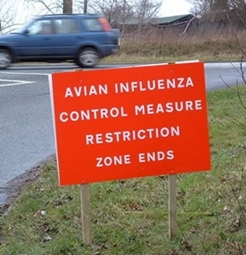
In response to the latest announcement on the proactive culling of 63,000 birds, including pheasants, partridges and ducks, in Lancashire, the GWCT is urging all those who are involved with gamebirds to read the official advice guidelines on gamebirds and avian flu, which were issued recently.
On 27 January a case of avian flu was confirmed in a flock of pheasants at a farm in Wyre, Lancashire. This case was proactively identified as part of a routine investigation of premises traced as a result of confirmation of the disease in Lancashire earlier this week. To contain the possible spread of disease, the Chief Veterinary Officer confirmed that the culling will take place. The premises will then be cleansed and disinfected, further reducing the risk that disease can be spread to other birds. Investigations will continue and the restrictions already placed on the sites will remain in force until cleansing and disinfection is finished and the investigation is complete.
Public Health England advises that the risk to public health from the virus is very low and the Food Standards Agency is clear that bird flu does not pose a food safety risk for UK consumers.
Whilst stringent biosecurity measures are put in place, it is crucial that those in the countryside remain vigilant and report any suspected cases. Guidance on how to spot avian flu and what to do if you suspect it is available from Defra here.
There are currently no restrictions on shooting activities and shoots can continue as normal. However, the GWCT advises that:
- Shoots near the areas that have confirmed cases should practice extra vigilance
- Keepers of captive gamebirds (e.g. overwintering breeding flocks) must minimise the risk of contact with wild birds where indoor housing is not practicable
- Be vigilant and look out for signs of sickness/disease/dead birds (captive, free living and wild birds) and report any concerns to the Defra Helpline (03459 33 55 77)
- Ensure that captive flocks of 50 or more birds (chickens, ducks, partridges, pheasants, etc) are registered with Defra
- Ensure high levels of biosecurity
Avian influenza – what is it and how is it spread?
Bird flu, or avian flu, is an infectious type of influenza that spreads among birds. The disease spreads from bird to bird by direct contact or through contaminated body fluids and faeces. Avian influenza isn’t an airborne disease nor is there evidence that any recent strain of avian influenza has been able to spread directly between people.
More information
Notes to editors
The Game & Wildlife Conservation Trust – providing research-led conservation for a thriving countryside. The GWCT is an independent wildlife conservation charity which has carried out scientific research into Britain’s game and wildlife since the 1930s. We advise farmers and landowners on improving wildlife habitats. We employ more than 60 post-doctoral scientists and other research staff with expertise in areas such as birds, insects, mammals, farming, fish and statistics. We undertake our own research as well as projects funded by contract and grant-aid from government and private bodies.
For information, contact:
Eleanor Williams
Telephone: 07592 025476
Email: press@gwct.org.uk